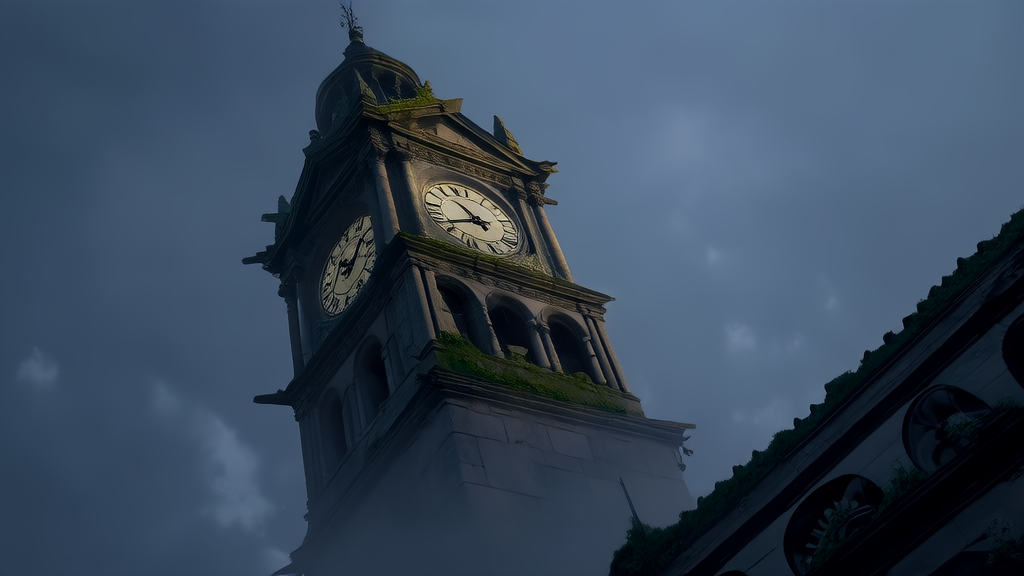🔮 Weird Tales & Urban Legends
The Frozen Clock Tower and the Secret of 3:17 Hidden in the Silence of Time

The old clock tower at the edge of town had always been a curiosity, its hands frozen at 3:17. No one knew when it stopped, but over the years, people began to notice strange things. The bell never rang, and the gears inside were silent, as if time itself had forgotten to tick. Some said it was haunted by the ghost of a watchmaker who died in the 19th century, others claimed it was a portal to another dimension.
Elias had always been fascinated by the tower. As a child, he would sneak past the rusted gate and press his ear to the cold stone walls, hoping to hear something—anything. But the silence was absolute. That changed on his 25th birthday.
He found himself standing in front of the tower again, drawn by an inexplicable pull. The sky was overcast, and the air felt heavier than usual, like the world was holding its breath. He pushed open the creaking door, and the scent of dust and aged wood filled his lungs. Inside, the walls were lined with broken clocks, some missing hands, others cracked and still. At the center stood a large, ornate clock that looked untouched by time.
As Elias stepped closer, the temperature dropped sharply. His breath formed visible clouds in the air, and the shadows around him seemed to stretch unnaturally. He reached out to touch the clock, and the moment his fingers met the brass surface, the room shifted.
Suddenly, he was no longer in the tower. The air smelled different—cleaner, almost metallic. The sun was high in the sky, and the streets were unfamiliar. People walked by without noticing him, their faces blank, their movements too synchronized. He turned to see a sign above a shop: “Clockwork Emporium.” The name sent a chill through him.
He wandered the streets for what felt like hours, trying to make sense of where he was. Everything was eerily orderly, as if the world had been reset to a perfect version of itself. Then, he saw a reflection in a window—a man standing behind him, but when he turned, there was no one there. The reflection moved, though, and it wasn’t his own.
Panic set in. He ran back to the tower, but the building was gone. In its place was a field of wildflowers, swaying gently in a breeze that didn’t exist. He collapsed to his knees, trembling. Was this real? Had he traveled through time?
Days passed—or maybe minutes, he couldn’t tell. He kept finding himself in different versions of the town. One day, it was a bustling city full of neon lights and towering buildings. Another time, it was a desolate wasteland with no signs of life. Each time, the clock tower reappeared, but it was always slightly different—sometimes taller, sometimes smaller, sometimes missing entirely.
One night, he returned to the tower, now a crumbling ruin covered in ivy. He climbed the broken steps and entered the hollowed-out structure. Inside, the air was thick with the scent of old paper and mildew. On the wall, he found a series of symbols carved into the stone. They matched the patterns on the broken clocks outside.
As he traced the symbols with his finger, the ground trembled. A low hum filled the air, and the walls began to shift. The clock at the center of the room started to turn, its hands moving backward. Elias stumbled back as the entire space warped, the walls folding in on themselves like a dream collapsing.
When the noise stopped, he was back in his apartment, the clock on his wall ticking normally. But something was wrong. The date on his phone read the same as it had before he left. He checked the calendar—his birthday had never come. He had spent weeks, or maybe years, in the tower, but the world had moved on without him.
He tried to talk about it, but no one believed him. They thought he was losing his mind. And maybe he was. But every night, he heard the faint sound of a clock ticking in the distance. Not from his apartment, but from somewhere else—somewhere beyond the edges of time.
And sometimes, when he closed his eyes, he could see the tower again, its hands spinning in slow, deliberate circles, waiting for someone to find it once more.
Published on en
🔗
Related Sites
- AI Blog — AI trends and tech news